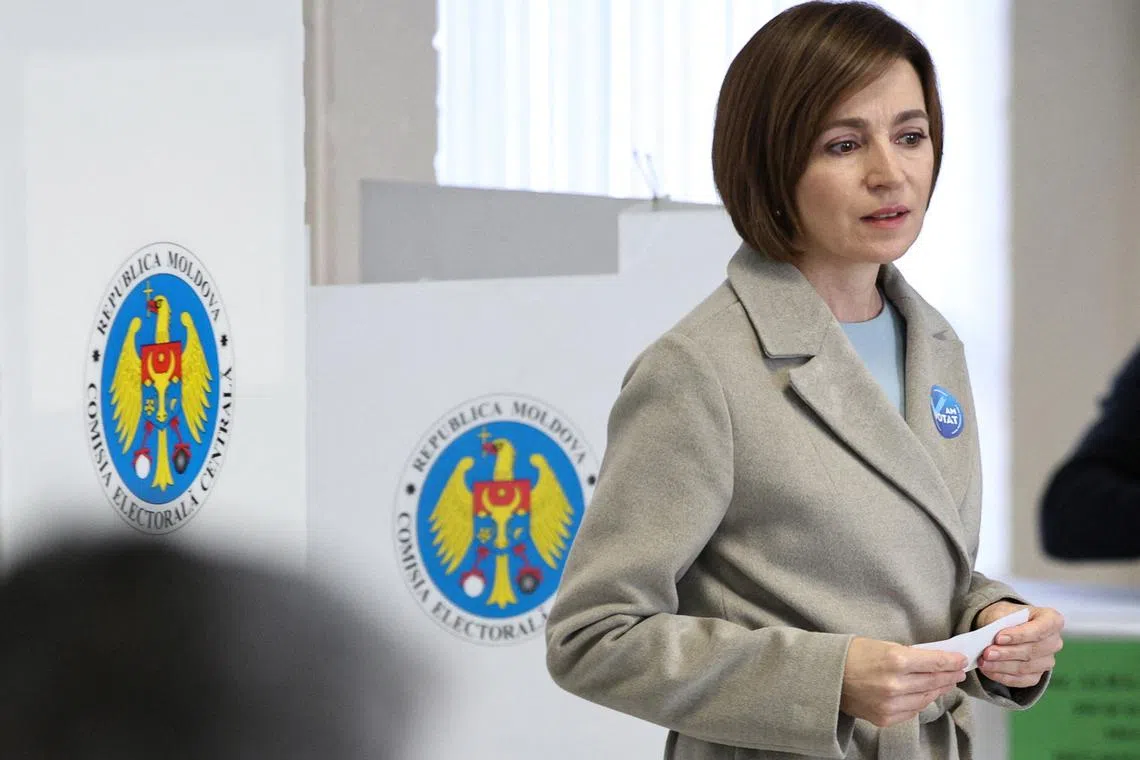News analysis
Moldova rebuffs Russia’s influence with re-election of its pro-Western leader
Sign up now: Get ST's newsletters delivered to your inbox

President Maia Sandu, a strong supporter of her country’s membership in the European Union, won 55 per cent of the votes cast.
PHOTO: REUTERS
Follow topic:
BRUSSELS – Russia’s attempts to maintain a sphere of influence in Europe have suffered a setback after voters in Moldova, a small former Soviet republic bordering Ukraine, re-elected their pro-Western president for a second term despite a massive Russian effort to influence the ballot’s outcome.
With all the votes in Moldova’s Nov 3 elections now counted, Ms Maia Sandu, the 52-year-old Western-educated economist who is a strong supporter of her country’s membership in the European Union, won 55 per cent of the votes cast.
She decisively beat Mr Alexandr Stoianoglo, a 57-year-old former prosecutor supported by the pro-Russian Socialists, who attracted the remaining 45 per cent of the ballots.
Addressing her supporters gathered in the capital Chisinau as the final results were announced in the early hours of Nov 4, President Sandu struggled to control her emotions. “Today, you have saved Moldova,” she told jubilant supporters.
Fellow European leaders are making no secret of their belief that Ms Sandu’s triumph is a rebuff of Russian efforts to meddle in elections.
French President Emmanuel Macron congratulated Ms Sandu on her “triumph over all interference and all manoeuvres”.
And so did EU officials. “It takes a rare strength to overcome the challenges you faced during this election,” Dr Ursula von der Leyen, president of the European Commission, the EU’s executive, wrote on social media platform X.
However, although Ms Sandu’s victory is undoubtedly significant, it is much more precarious than it first appears.
The resources Russia devoted to bring about her defeat, and the number of pro-Russian forces Moscow mobilised against her, shocked most Western governments.
Nor are all such Russian efforts doomed to failure. In Georgia, another former Soviet republic, pro-Russian politicians have just returned to power due to similar tactics.
Moldova, one of Europe’s poorest countries, was created by the Soviet Union at the end of World War II out of territory the Russians seized from neighbouring Romania.
Most of Moldova’s three million-strong population is ethnic Romanian, and the official language is Romanian.
However, the country is also home to many Russians and Russian speakers, who settled in the republic during the Soviet period and now account for around a fifth of the population.
Moscow has always encouraged them to oppose Moldova’s integration into Western security structures, largely because the landlocked country borders Ukraine, and cornering Ukraine remains Russia’s key strategic objective.
On Oct 20, Moldovans were called to vote in a referendum designed to insert a new Article in their Constitution, making membership in the EU a “national strategic objective”.
The EU’s average per capita national wealth is almost five times higher than Moldova’s, so a “yes” vote seemed a foregone conclusion.
But to everyone’s surprise, the referendum passed with the thinnest of majorities: Only 50.5 per cent voted in favour of the EU, with 49.5 per cent casting a vote against it.
This was primarily due to a negative campaign run by a certain Ilan Shor, a convicted fraudster and a key actor in a 2014 case of grand theft in which US$1 billion (S$1.3 billion) – the equivalent of around 12 per cent of Moldova’s entire national wealth – was stolen from the country’s banks through fictitious loans.
Shor, who fled Moldova, is now a Russian citizen and does Moscow’s bidding. During the EU referendum campaign, Moldova’s internal security agency accused him of depositing around US$15 million into the bank accounts of more than 130,000 Moldovan citizens to secure their “no” vote.
Shor’s money was probably also behind President Sandu’s failure to secure an absolute majority of the votes in the first round of the presidential election, which was held at the same time as the Oct 20 referendum.
That forced her into the second presidential electoral round on Nov 3, when Russia went to even more extraordinary lengths to secure her defeat.
Moldova’s key foreign currency earner is remittances from its citizens, with up to 30 per cent of the population working overseas.
The Russian authorities ensured that those Moldovans working in Russia would cast their ballots against Ms Sandu.
Video clips circulating on social media showed Moldovan citizens being led to vote at Moldovan embassies and consulates in Russia and Belarus – Russia’s closest ally – in organised columns.
Because Moldova’s voting stations in Russia were few and far between, the Russians also organised flights for expatriate Moldovans to vote in other places, such as Istanbul in Turkey.
Moldovans working in the EU – most of whom support Ms Sandu – were subjected to separate intimidation efforts, such as fake videos claiming to show Ms Sandu is mentally ill, or personalised threats delivered through text messages on mobile phones.
Several bomb scares temporarily closed voting stations in Germany and neighbouring Romania, where most overseas Moldovans reside. The objective of this exercise was to restrict the number of diaspora Moldovans able to vote, in the sure knowledge that this could hurt Ms Sandu’s re-election prospects.
Russia’s efforts to skew the electoral results ultimately failed, but only just. Ms Sandu prevailed solely because of the votes cast for her by the Moldovan diaspora; if the decision were left only to those living inside Moldova, a pro-Russian would now be the country’s new president – precisely what Moscow wanted.
In Georgia, whose territory Russian troops invaded in 2008 to retain influence over the country, similar recent Russian electoral interference efforts were crowned with much greater success.
The Georgian Dream party, created and bankrolled by Mr Bidzina Ivanishvili, another wealthy individual who made his money in Russia and often echoes pro-Russian narratives, claims to have won 54 per cent of the country’s ballots in parliamentary elections held on Oct 26.
International observers and Ms Salome Zourabichvili, the pro-Western president of Georgia, charge that the elections were marred by episodes of vote-buying and ballot-box stuffing, as well as intimidation and pressure on voters, conducted mainly at Russia’s behest.
These allegations are not as well documented as Russia’s actions in Moldova. Yet, there is no doubt that the victory of the Georgian Dream party represents a dream come true for Russia.
Nor is there much doubt that the Russian authorities will continue to devote generous financial and political resources to influence future elections in their neighbourhood.
“Europe should expect more and more overt forms of electoral interference. These will become the standard and more aggressive method of operation for Russia,” claims Ms Oana Popescu-Zamfir, a prominent European expert on Russian disinformation strategies.
“Most electoral manipulation efforts will occur well before voting day. And most will take place outside the targeted country,” warns the director and founder of foreign policy and security think-tank GlobalFocus Centre.


